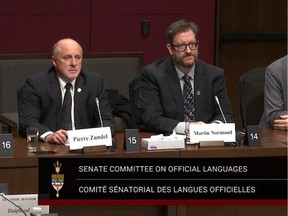Francophone schools file language complaint over international student cap
The Trudeau government didn’t abide by its own newly updated Official Languages Act, says group including CCNB and Universite de Moncton

Article content
The country’s francophone post-secondary schools outside of Quebec have filed a complaint with the official languages commissioner over the federal government’s move to cap the number of international students they can bring to Canada.
The Trudeau government didn’t abide by its own newly updated Official Languages Act, contends the group of 22 institutions, which includes CCNB and Universite de Moncton.
It adds that francophone institutions outside of Quebec should be exempt from Ottawa’s move to curb international student growth.
“On behalf of its members, l’Association des collèges et universités de la francophonie canadienne has filed a complaint with the Office of the Commissioner of Official Languages regarding the decision to establish a cap (on foreign students),” said its director of the strategic research, Martin Normand, in front of a Senate committee on Monday evening.
He made the comments while sitting alongside College Communautaire du Nouveau-Brunswick president Pierre Zundel, who also heavily criticized the federal government, stating the policy will have a “devastating impact on the sustainability of French language in New Brunswick.”
In an interview with Brunswick News on Tuesday, Zundel said CCNB’s ability to offer a wide range of classes depends on international student enrolment.
Without them, domestic enrolment wouldn’t be enough to sustain the school, he said.
“With international students, we’ve not only been able to sustain our programs, but it’s given us the basis to add some in some really critical areas like health so we have more personal support work and nursing offerings,” Zundel said.
He added that, without a school, francophones would be forced to learn in English or move elsewhere.
The federal government announced in January it was slashing by 35 per cent the number of undergraduate study permits it hands out across the country.
The cut was a response to concerns that newcomers were adding to the national housing crisis.
Normand said that a blanket cap on international students doesn’t take into account the needs and distinct reality of linguistic minority communities, as required by the recently updated languages act.
Last fall, the feds announced new French-speaking immigration targets that would see the percentage of francophone newcomers coming to Canada climb from a current 4.4 per cent to six per cent in 2024, seven per cent in 2025, and eight per cent in 2026.
Normand said international students make up roughly 30 per cent of the student body in francophone post-secondary institutions outside of Quebec, a number he said is “vital” to the growth of minority French communities.
He said while those students fill jobs during their studies, with the vast majority indicating upon arrival that they want to stay in Canada permanently.
“This clearly illustrates how Immigration, Refugees and Citizenship Canada must rely on our institutions to achieve its new, more ambitious targets for francophone immigration,” Normand said.
Office of the Commissioner of Official Languages spokesperson Marie-Michèle Desbiens confirmed on Tuesday that it has received a complaint, which is currently “being analyzed” to determine if further study is needed.
Meanwhile, federal Official Languages Minister Randy Boissonnault told reporters in Ottawa on Tuesday that he is “working closely” with the Immigration minister “to ensure that French-speaking post-secondary students can continue to come here to Canada.”
The institutions contend the feds downloaded that consideration to the provinces.
New Brunswick was allotted 5,580 new undergraduate international students by Ottawa for the upcoming school year, with a total of 9,300 acceptance letters to hand out by the Higgs government to the institutions of its choosing to fill those spots.
The feds have since topped up the number of acceptance letters in New Brunswick to 14,651, acknowledging the lower acceptance rates of international students in the province, particularly at francophone institutions, but again left it up to the province to decide how to allocate the letters.
Zundel applauded the Higgs government’s decision to allocate a larger number of acceptance letters to francophone schools in recognition that they have a significantly lower conversion rate in turning offers into actual students.
“I think they did an excellent job,” he said.
The concern remains with the federal government.
At the Senate committee, Université de Saint-Boniface president Jacques Frémont charged that “the burden has once again been placed on the backs of minority French-speaking establishments to defend their existence.
“And I admit that it is extremely disappointing in the wake of the adoption of the Official Languages Act,” Frémont said.
Zundel said the importance of international students is far reaching.
“New Brunswick’s labour ministry says there’s going to be about 130,000 jobs to fill in the next 10 years or so and only about 55 per cent of those are going to be filled by students coming out of high school, given our demographics,” he said.
“There’s 45 per cent of the jobs to be filled.
“When the federal government puts a limitation on one of the central tools the province has to make sure there is staff in the emergency rooms and on construction sites and everywhere else, that’s a real problem.”












Postmedia is committed to maintaining a lively but civil forum for discussion. Please keep comments relevant and respectful. Comments may take up to an hour to appear on the site. You will receive an email if there is a reply to your comment, an update to a thread you follow or if a user you follow comments. Visit our Community Guidelines for more information.